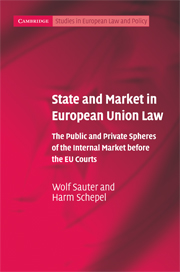 State and Market in European Union Law
State and Market in European Union Law Published online by Cambridge University Press: 22 January 2010
Introduction
Article 86(2) EC has been at the heart of much recent debate on the relative merits of liberalisation of public services. In the process, a new Article 16 EC was added by the Amsterdam Treaty that is a monument of vagueness:
Without prejudice to Articles 73, 86 and 87, and given the place occupied by services of general economic interest in the shared values of the Union as well as their role in promoting social and territorial cohesion, the Community and the Member States, each within their respective powers and within the scope of application of this Treaty, shall take care that such services operate on the basis of principles and conditions which enable them to fulfil their missions.
Perhaps most noteworthy is the fact that this leaves the existing rules on services of economic interest of Article 86 and on State aids of Article 87 untouched. A crucial amendment is found in the following addition introduced by the Lisbon Treaty to what now is set to be Article 14 of the Treaty on the Functioning of the European Union:
The European Parliament and the Council, acting by means of regulations in accordance with the ordinary legislative procedure, shall establish these principles and set these conditions without prejudice to the competence of the Member States, in compliance with the Treaties, to provide, to commission and to fund such services.
The choice of regulations is significant in that it makes it likely that the Member Statesapos; freedom to define services of general economic interest will be reduced.
To save this book to your Kindle, first ensure [email protected] is added to your Approved Personal Document E-mail List under your Personal Document Settings on the Manage Your Content and Devices page of your Amazon account. Then enter the ‘name’ part of your Kindle email address below. Find out more about saving to your Kindle.
Note you can select to save to either the @free.kindle.com or @kindle.com variations. ‘@free.kindle.com’ emails are free but can only be saved to your device when it is connected to wi-fi. ‘@kindle.com’ emails can be delivered even when you are not connected to wi-fi, but note that service fees apply.
Find out more about the Kindle Personal Document Service.
To save content items to your account, please confirm that you agree to abide by our usage policies. If this is the first time you use this feature, you will be asked to authorise Cambridge Core to connect with your account. Find out more about saving content to Dropbox.
To save content items to your account, please confirm that you agree to abide by our usage policies. If this is the first time you use this feature, you will be asked to authorise Cambridge Core to connect with your account. Find out more about saving content to Google Drive.